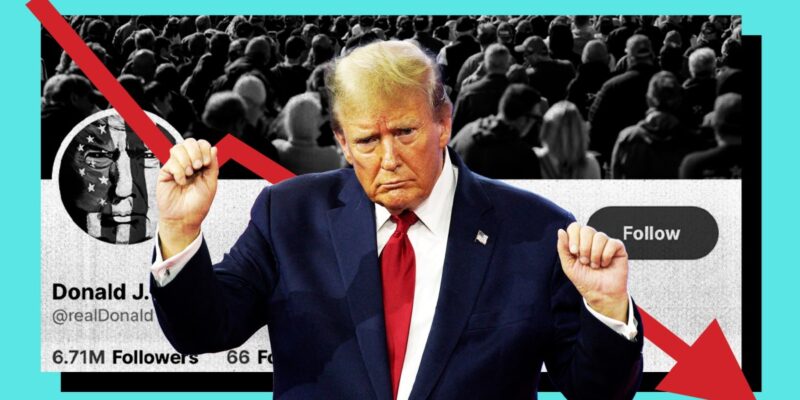
After repeated delays, Donald Trump finally seems to be taking his Truth Social app public—an accomplishment that could set him up for a gigantic potential windfall. “Potential” being the operative word there.
In the moments after shareholders approved a merger between a publicly traded SPAC corporation and Trump Media and Technology Group—the parent company of Truth Social—the SPAC’s stock price began to slide. (A SPAC is a blank-slate corporation established for the sole purpose of merging with another business that wants to go public.) While some noted that the deal could give Trump an enormous shot of money right when he needs it most—he’s facing a deadline early next week to pony up around half a billion dollars for a bond in his fraud case—the stock’s initial volatility also wiped approximately that much money off his balance sheet in a matter of hours. Of course, that’s a danger with any publicly traded stock, and it’s entirely possible that the price will have rebounded by the time you read this. But it demonstrates why the long-awaited merger doesn’t necessarily solve Trump’s cash problems.
Trump established Truth Social in 2022 to be a MAGA-version of Twitter, and the app has sputtered along, powered almost exclusively by Trump’s own posting on the site. The social media platform has amassed just 10 million downloads—all of them in the United States—and had only about 5 million active users in February. Compare that to the roughly 3 billion active users on Facebook. According to filings made before the merger, Truth Social brought in just $3.3 million in ad revenue in the first nine months of 2023 and had a loss of around $49 million. As Elon Musk could probably tell Trump, making money off a social media site is difficult—even before Musk, Twitter struggled to turn a profit on much larger revenues. Profitability is nearly impossible with a user base as small as Truth Social’s.
Despite the rather grim business prospects, Trump was determined to take the company public. But, given the scrutiny that Truth Social would probably face from investors if he went the traditional route of an initial public offering—not to mention likely trouble he’d have finding a Wall Street bank interested in working with him to shepherd the deal through the process—Trump chose an alternative route to the stock market: a special purpose acquisition company, or SPAC. Essentially, investors create a completely empty company and take it public—it has no business, no revenue, and no purpose, but it is traded on a stock exchange. Then, they find a firm that wants to become public, like Trump’s company, the two entities are merged, and—voila!—Truth Social is now on the stock market.
It’s supposed to be quick and easy way to do things, but in the two and a half years since Trump announced the plan, SPACs have fallen out of favor on Wall Street, in large part because they often fail to yield particularly successful outcomes. Trump’s deal was also beset by all sorts of legal investigations into whether corners were cut or rules broken—last July, the SPAC that Trump partnered with agreed to pay an $18 million civil penalty for fraud—and infighting between Trump’s early partners continues.
At least initially though, the merger looks good for Trump. Trump’s media company will get as much as $300 million in fresh investment to help prop up Truth Social, and Trump himself will own 79 million shares in the new company—which will start trading as soon as Monday under the stock symbol DJT. After the merger on Friday, the share price opened at $45, meaning Trump’s stake would be worth about $3.55 billion. But then the price promptly began to drop, going as low as $38 a share in the first two hours—wiping about $500 million off of Trump’s windfall. The price rebounded during the day, though it remained well below $45 Friday afternoon.
All of this is happening as a deadline for Trump to pony up $557 million nears. This past fall, Trump lost a civil fraud lawsuit filed by New York Attorney General Leticia James, in which he was found liable for cheating insurance companies and banks by giving them falsely inflated values for his properties—which meant he saved hundreds of millions on insurance policies and loan interest. The judge in the case ordered Trump to pay $455 million, including penalties and interest, and he theoretically has until Monday to do so. Trump is appealing the case, which might takes years to settle, and he can avoid paying the judgment for now if he posts a bond—money put up by him or someone else to ensure the state will get paid if Trump loses the appeal. This week, Trump’s attorneys complained to an appeals court that Trump has been unable to find someone to post the $557 million bond (the required amount is more that what Trump currently owes) because it is too large and no bond companies will accept his real estate holdings as collateral.
His new Truth Social fortune could be extremely timely—but there are problems. For starters, there’s typically a six-month ban on insiders selling off shares in a newly public company. It’s a rule designed to keep them from dumping stock and undermining the rest of the investors who would see the moves as a lack of confidence. Trump could get a waiver from his new company’s board of directors—which includes a number of staunch Trump allies—but if he did that, it would likely hurt the overall share price. And by selling shares, Trump would be giving up at least some of his control over the company—he owns an estimated 60 percent at the moment. It also seems unlikely that bond companies would be eager to accept shares in Truth Social as collateral, given the volatility of the share price.
Perhaps the biggest problem for Trump is that given Truth Social’s underlying financial issues, the SPAC is seen by some as a “meme stock“—an investment that’s made by enthusiastic Trump supporters rather than savvy investors. That means the share price has risen and fallen as Trump’s fortunes have—the biggest recent jump coming earlier this year after Trump won the Iowa caucuses. And given his ever-mounting legal problems, Trump could have quite a few costly news cycles over the next year.















